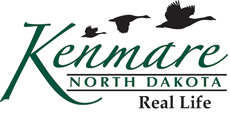Kenmare ND - Upside Down Under
Real People. Real Jobs. Real Adventures.
Upside Down Under
By Marvin Baker, a new weekly column in The Kenmare News
Is 'Wexit' the answer?...
Posted 11/26/19 (Tue)
There’s a movement going on across the border in
For years there’s been a separatist movement in
But ever since the federal election on Oct. 21, western separatists have become quite vocal and are actually claiming their new country as “The Republic of Western Canada.”
This has happened before in Canadian history, and one would think the nation learned a lesson in October 1995 when a federal election for
Had that happened, there were all kinds of possible scenarios, none of them would have been good for
Now, it’s happening again. This time it’s
It turns out that Justin Trudeau was re-elected as prime minister on Oct. 21. Trudeau, like his father and former prime minister Pierre, is a liberal and isn’t very well liked west of
Farmers, ranchers, oil developers and even the mining sector are fed up with the Trudeau government not listening to their needs. And apparently, there is a law in Canada, I’m not certain about this, but the oil-rich province of Alberta, has to send money east to help Quebec because its economy isn’t doing so good right now.
I guess I’d be upset too, if that were the case. Even though it’s heavily populated,
I just kind of passed all this “Wexit” stuff off as nothing new, but when a friend who’s a
If the
So do we continue to trade with
And how about tourism? Whether you go fishing in Flin Flon, catch a Blue Bomber game in
They’d be really different in
We can talk about possible scenarios until we are blue in the face, but we do know there would be change and it would affect
Working in this state as a journalist for the past 33 years, I’ve come to find out there are a lot of Canadians living in
I personally know Canadian citizens who are living in
Secession in the
There is a simple solution to all this. Justin Trudeau needs to listen to his constituents in the west and compromise on some economic deals that are damaging the west.
As I write this article, Trudeau and Saskatchewan Premier Scott Moe are discussing
